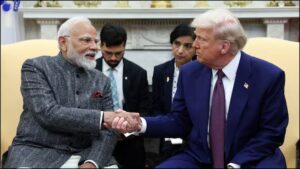GS-2: International Relations

Key Highlights
- India-U.S. energy collaboration now emphasizes critical minerals, nuclear energy, and clean technology.
- A 2024 MoU aims to diversify critical mineral supply chains and reduce reliance on China.
- India targets 20 GW of nuclear capacity by 2047, up from approximately 8 GW currently.
- The partnership focuses on joint development in battery technology, small modular reactors (SMRs), and clean hydrogen.
- India will co-develop traceability systems, explore blockchain for mineral tracking, and expand clean energy R&D.
Detailed Insights
- Energy Security Principles:
- Ensure secure energy at predictable prices.
- Prevent supply disruptions.
- Develop a sustainable, clean energy system.
- Critical Minerals Compact:
- U.S. and India to share strategic stocks and build resilient supply chains.
- Leverage institutions like the U.S. Strategic Petroleum Reserve and India’s stockpile.
- Explore cooperation at the Quad level.
- Clean Tech Investments:
- Focus on modular nuclear reactors, green hydrogen, and advanced battery storage.
- Strengthen the India-U.S. Clean Energy 2030 agenda with clear benchmarks.
- Private Sector Role:
- Speed up project timelines.
- Standardize designs.
- Provide long-term purchase agreements for financial viability.
- Nuclear Strategy:
- Offers reliable base power to complement intermittent renewables.
- Supports India’s ambitious expansion from 7 GW to 20 GW by 2047.
- Enhances nuclear safety, decommissioning, and waste disposal through U.S. collaboration.
Scientific/Technical Concepts Involved
- Critical Minerals: Essential elements for clean technologies like batteries, wind turbines, and semiconductors (e.g., lithium, cobalt, rare earths).
- Small Modular Reactors (SMRs): Compact nuclear reactors with enhanced safety and lower spatial/financial requirements.
- Traceability Blockchain: Technology for tracking and verifying mineral origins to ensure supply chain transparency.
Significance
- Strengthens the India-U.S. strategic energy partnership, critical in global geopolitics.
- Reduces India’s reliance on China for energy components.
- Supports India’s Make in India and energy transition objectives.
- Lays the foundation for a clean, resilient, long-term energy ecosystem.




